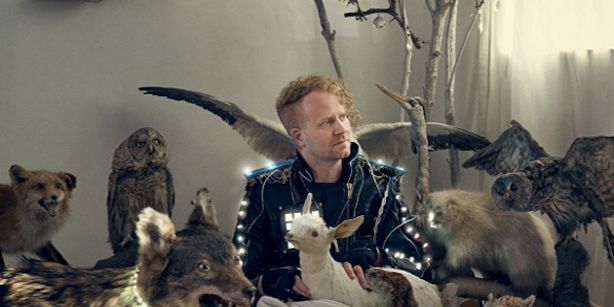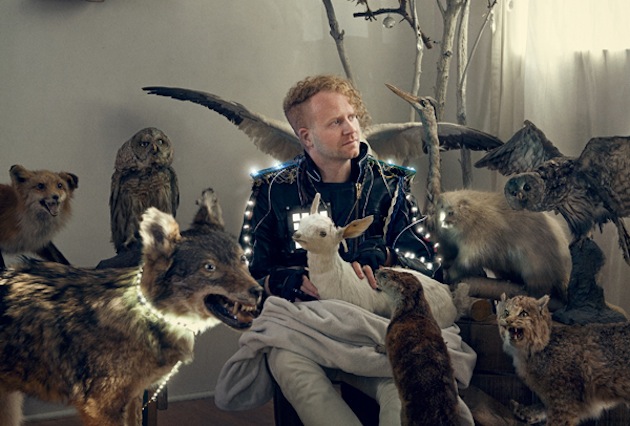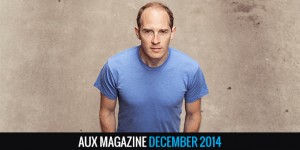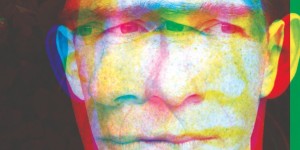 Music
Music
Born Gold's Cecil Frena talks DIY economics and pooping your pants as an adult
by Josiah Hughes
October 21, 2013
Born Gold talks DIY economics, engaging the cultural conversation at large, and, well, shitting your pants as an adult.
A/S/L features interviews with musicians via online chat. Get it? The internet.

Edmonton-based pop auteur Cecil Frena used to transform houses, lofts, and the occasional real venue into mini-raves on countless North American tours as the leader of Gobble Gobble, a blissed-out experimental outfit. The live act, which also helped launch the career of Purity Ring’s Corin Roddick and spent close time with Grimes and Elite Gymnastics, morphed into Born Gold.
But Frena’s second album, 2012’s Little Sleepwalker, met mixed reviews for its high-concept approach to dance pop. His new album I Am An Exit seemingly fixes that problem, marrying the pop appeal of the cult classic Bodysongs with Little Sleepwalker‘s near-academic approach for something that sounds very 2013—and very Cecil Frena.
I got Frena on Gchat in the middle of a tour to talk DIY economics, engaging the cultural conversation at large, and, well, shitting your pants as an adult.
Josiah Hughes: So the idea is we just chat it up! Where are you right now?
Cecil Frena: Santa Barbara, in the heart of the west coast Spring Breakersdom
Josiah Hughes: Amazing! What kinda house did you play at last night?
Cecil Frena: The place we played is called Biko House — it’s a housing co-op for 18 people that puts on shows in a garage they’ve converted into a performance space. Shows are all ages and open to the public.
Josiah Hughes: Is it way harder to book house show only tours? What’s the benefit and what’s the downside?
Cecil Frena: I mean it’s definitely harder. First of all the availability of houses is always a challenge. Like I was in this goofy position on this tour where someone would say to me “hey would you like to play this radical DIY space?” and I’d be like “NO.” It’s kind of perverse.
Josiah Hughes: Hahahaha what do you mean? Because it’s not a house?
Cecil Frena: Yeah exactly. I was trying to be really idealistic about getting only houses.
Josiah Hughes: ahahahah.
Cecil Frena: Yeah obviously no shots at cool DIY spaces.
Josiah Hughes: Of course not.
Cecil Frena: But this tour was an attempt to lift everything out of even conventional alternative contexts. I mean I really feel like even the best DIY spaces have this sort of overlay of cultural capital and social positioning, whether they intend to or not and so like, your average person who is not rabidly into music can feel somewhat alienated or struggle with it. I mean it’s not a huge thing, but more positively framed houses just have this completely unguarded and inviting atmosphere. There is no audience / performer division. People can come just to hang out and there is not the same like, record store Bitcoin trading at play that people might sense, whether accurately or not in other contexts. House shows are just my favourite shows at the end of the day, so I mean, there’s that too. It’s not really a hardline political thing so much as it is just me eating the best pizza every day.
Josiah Hughes: Hahahaha. Have you played any house shows at houses that aren’t even associated with underground music per se? Similar to our magical night in Springhill, NS, for example?
Cecil Frena: Yeah dude, the magical night in Springhill is still on the all-time list of total insanity. And yeah, I mean, the point of this tour is that many of the shows actually are just at people’s houses. Not necessarily cool DIY houses or w/e, but we’re doing those too.
Josiah Hughes: Is there a struggle to find that line between having people promote your shows and drawing too much attention to a house party?
Cecil Frena: Yeah definitely, my PR people hate me.
Josiah Hughes: That’s the line I struggle with in my job too… so many cool things happen in illegal spots.
Cecil Frena: We have this like, two month long official tour in support of the album and are asking them to try to secure regional and national press, and they’re like “we can’t reasonably do this.” And I’m sensitive to the issue. I guess like, by centralizing my links to Facebook events, we are letting each house determine more or less what they are comfortable with. If they don’t want to post the address, they can make their event reflect that. But yeah I mean the end result is that attendance every night is kind of a crapshoot because you can’t really promote the shows through conventional means. But some people are writing about it regionally and nationally, and are handling it pretty sensitively imo.
Josiah Hughes: What about in terms of, presumably, trying to make a living as a musician — is it a struggle in that regard or do you get taken care of better by DIY artist spaces?
Cecil Frena: I’m going to write an exhaustive post about the economics of this, at the suggestion of my buddy James Brooks, who pointed out that the information will be useful to a lot of people. I think the economics of it are kind of surprising. They’re not amazing or like “reconfigure the music industry” necessarily….
Josiah Hughes: Hahahaha
Cecil Frena: But there is a certain class of musician who I think will find this kind of tour really rewarding. Like the other major benefit of this kind of thing is morale stays really high.
Josiah Hughes: I bet!
Cecil Frena: Shows are consistently awesome.
Josiah Hughes: I look forward to reading that then! That’s something I find really cool about you and your peers… a willingness to be frank on tumblr about the inner workings of being a musician in 2013. Grimes, Brooks and you all have a willingness to share. I guess that’s not really a question…
Cecil Frena: Thanks man. Yeah I think like, I’ve seen people get hurt by their openness too, but I think that’s just part of the risk of candidness and honesty. So I mean, this is a subject I think I have valuable insight on.
Josiah Hughes: Totally. Y’all are emo kids making different sounding music, right?
Cecil Frena: I can’t speak for anyone else (I think Claire has a love/hate thing w/ emo), but I definitely am.
Josiah Hughes: Let’s talk about the new record. Your last LP [Little Sleepwalker] seemed to go over a lot of people’s heads or something, and I think you even described it as difficult. Did you make a conscious effort to write something a little more accessible on the new one?
Cecil Frena: Yeah I mean like, it’s funny because I did my first interview before the last record and was basically just attenuating the blow. It kind of split people down the middle, and I guess I knew it was going to do that. There was a certain irresponsibility in releasing like, a difficult art diversion before I’ve even found my audience, but it’s also something I’m proud of and wanted people to hear anyway. I mean, even before it came out, I was talking about this next one because it was written and partly produced. And yeah, I mean my project ultimately is to make pop music.
Josiah Hughes: Totally. But it’s not like the last one was divisive so you decided to make something more pop… this was your plan all along.
Cecil Frena: Yeah I mean I have date-stamped proof lol. So this record is kind of like the logical digestion of both Bodysongs and Little Sleepwalker into pop forms.
Josiah Hughes: Rad. Why did you decide to start doing interviews, anyway?
Cecil Frena: A lot of people treated Little Sleepwalker as my debut which was kind of frustrating, since it’s actually a response to Bodysongs but I also get that, like, I haven’t earned a narrative arc or whatever yet, so all good.
Josiah Hughes: Do you think in terms of albums when you’re making new music?
Cecil Frena: Yes and no. That’s ultimately how I digest things. I did a run of 7-inches, some of which came to constitute Bodysongs, and I make pop music so like the song is a very fundamental form. I have a lot of work to do but ultimately I want to end up more in a lane that is more like Depeche Mode than Erasure, where there are big songs but the LP as a form of expression is clearly a very high value for the artist.
Josiah Hughes: Do you think you’re hard on yourself? Like when an album comes out, are you satisfied with it for what it is or do you find things you wish you’d done differently?
Cecil Frena: I mean I’m vicious with myself. I just want to be better than I am, and I’m not yet. So yeah, every record, I mean, I might get a listening session with it a year out from finishing it where I actually engage with it and feel proud for a second, but mostly it’s just eternal desert father shit.
Josiah Hughes: Hahahahha
Cecil Frena: Pull the whips out and stroke the back.
Josiah Hughes: Hahahahhaha
Cecil Frena: I think I came around on Bodysongs recently, which was a nice feeling. Always takes a year or two. But still, its problems are obvious to me, so I’m always trying to translate that to the next thing.
Josiah Hughes: That’s probably a better way too be though… there are too many shitty, boring performers in the world who have delusions about how good they are. Better to be a great performer never satisfied with himself, probably.
Cecil Frena: I feel like honestly, that kind of artist is just a systematic product of the way the music industry is structured to support ten-percenters. Like the idea of being drunk on your own juices only makes sense when you are surrounded by a ridiculous enclave of pushers who want to make you think you are that way, and take away your responsibilities for their benefit. I’m not expressing like a broad skepticism about working with other people on my art, I do have some incredible humans on my team but I really think that like, the “rock star” as a trope is something that can be historically understood as the product of systematic forces that conspire to prevent any possibility of self-awareness or engagement with reality and eventually produces major diminishing returns.
Josiah Hughes: That’s definitely true but I also don’t think it’s exclusive to people within the industry… there are a ton of completely DIY home recording artists who are just as self-satisfied.
Cecil Frena: Yeah that’s a good point. So there’s another issue here, which is just that it’s so hard to see yourself. If you want to make great art, you have to foreground things that are close to you and be brave. You have to be willing to say what you feel in increasingly direct terms but then that literally means people will be shitting on your closest feelings in a public forum and just having a party or advancing their careers as a result of the shitstorm. So I mean I guess purely as a defense mechanism I understand being drunk on your own juice.
Josiah Hughes: Hahahaha yeah absolutely.
Cecil Frena: And a lot of my favourite artists have this radical self-confidence that I think other people confuse for being drunk on your own juice, because ultimately almost no good art comes from a place of insecurity. I mean good art has been made specific to insecurity, but I’m willing to bet it is never made in a moment of insecurity. Like I feel like you have to live through it and then look back on it from this vantage of relative strength to do anything worthwhile.
Josiah Hughes: Yeah that’s a really good point. Sometimes it’s made with feigned insecurity, which is the worst.
Cecil Frena: Oh man. But even like really sincere insecurity, it’s hard to sell, you have to be one of the absolute best in terms of craft to make that land and not just be totally terrible and cringeworthy.
Josiah Hughes: Too true. Having said that, when a new album is about to come out, what’s your attitude towards it? Do you get anxiety about how it’ll be received or anything?
Cecil Frena: I used to. Like I think with Bodysongs I was kind of really naively optimistic about it, and with Little Sleepwalker I was just bracing myself. The experience of both cycles was really good for me. I think now I feel a lot more secure in the idea that this is just a thing I’m going to be doing for a long time. And I mean, irrespective of outcome. So I think like, I’m on some Zen shit now
Josiah Hughes: Totally. So regardless of outcome, where does the drive come from? What are you getting out of this?
Cecil Frena: Oh I mean, I’m a maniac. Like I have foregone normal living circumstances and not insignificant potential earnings in order to just be a person that makes records. I derive so much identity value from being what I always wanted to be, a person that makes records. It might sound kind of dumb but I wake up and feel incredible every day.
Josiah Hughes: That’s awesome! What a great way to be!
Cecil Frena: I want to be successful, of course, that’s not a secret. But the reality is, if I’m not, I still feel like what I am doing is exactly what I should be doing. Like I guess that’s a hard thought to articulate, but it seems really simple and undeniable to me at this point. I had about 7 different jobs before I finally caved and was like, “okay — you either do this shit or you gradually become something really scary.” At this point in my career, I more or less know what I have to give up to be a person that makes records for the rest of my life. I don’t have a naive optimism about the odds of my impending wealth. I’ve just decided that I’m willing to clean house and lower my overhead to allow for this to continue.
Josiah Hughes: Awesome! Do you have a long-term plan of what kind of records you’d like to make next?
Cecil Frena: No, I don’t know if that kind of planning is really helpful. I mean, I don’t even know enough about like, making great records yet — I’m just zoomed in on the next one and want to make it as strong as I can. It’s coming along. There’s too much to learn right in front of me.
Josiah Hughes: So you’re saying you’ve already started working on the next one?
Cecil Frena: Of course I have.
Josiah Hughes: Do current trends or sounds of underground music come into play when you’re creating? Obviously you don’t jump on bandwagons, but do you attempt to engage the cultural conversation going on in music, or do you stick within your own lane?
Cecil Frena: Yeah I mean that’s a great question. It’s really complicated and I think people can feel free to call bullshit on me. Anyway, fundamentally the sounds that I fuck with are always 100% things that I care about at a given moment, I would never engage with anything I didn’t seriously get excited about. In the case of Bodysongs, a lot of the sounds on it were not cool at the time at all. It was a bit of an aesthetic island. Whereas with Little Sleepwalker I was really engaging with things that I was excited about that were happening in 2011 when I finished it, and I guess I learned a lot by doing that, about interfacing with history when you’re making art. So the whole trap thing happened, and suddenly people’s attitudes towards a lot of the sonics were actually, within a very short period of time, radically altered, including my own. I’ve meant to write something about this but I don’t want it to come off as like a long subtweet or whine fest because it’s something I’m sincerely thinking about and kind of fascinated by. And I guess I really do think there’s some value to be had with attempting to participate with what’s happening, but the line between making a contribution to some kind of conversation and making something that gets swept away with the dregs of fashion is a very thin one and something I still haven’t figured out exactly how to navigate, and I think my strengths might play to aesthetic island hood. There is also this other interesting thing that has happened where the sounds that me and my friends cared about suddenly became like extremely oversaturated, and it’s weird because like, that’s not a check I’m cashing. But I can definitely see how people might think that I’m trying to.
Josiah Hughes: The oversaturation part you mentioned is totally shitty too. But at least you’re willing to admit that trends and movements are valuable. Some people think they’re useless and still only care about Squarepusher or something (no shade).
Cecil Frena: Oh dude, I definitely think trends are valuable. Like I said, it’s a thing I’ve experimented with and I have this fundamental optimism about the “future” of music. Which might be naive or regionalized from a more distant periphery, but that keeps me super inspired. I’m just still figuring out exactly how it is I want to interface with trends. That’s tricky and I think I am in large part going to swim back out to my island.
Josiah Hughes: Rad. Okay I could straight up talk to you all day, but I gotta wrap it up. Tell me a funny story about one of your stops on this tour so far.
Cecil Frena: We’re still in the first days, but you’re making me think this tour isn’t very funny. But here’s one: another tour in Florida. I always sleep in the van if we can’t bring our gear somewhere safe, just to keep an eye on it and prevent the loss of everything that matters to me. Anyway, the band was crashing in this like, super nice mansion, so I was parked just outside on this ritzy residential street. We had had terrible burritos the night before (never buy burritos in Florida, get Cuban food). I woke up in the passenger seat of the van, knowing something was very, very wrong. I ran outside to try to get into the mansion and avail myself of the facilities but it was 5 a.m. and the place was locked. I ran back to the car to drive to a gas station but as I hit the sidewalk something happened — part of my insides declared mutiny and loosened. So that’s how I shit my pants in Florida as a grown man.
Josiah Hughes: OMG yesssss! That’s amazing! I have a few good stories about shitting my pants as an adult too, I often tend to tell them to girls at parties. I think that’s a sign that I’m happily married, that’s my go-to story with other girls.
Cecil Frena: I’m single and I still tell that story to girls at parties.
Josiah Hughes: Hahahahaha. Best story. Okay, I really gotta go. Have a safe trip and I hope I’ll cross paths again with you soon!
Cecil Frena: Haha, thanks for the time too man, really appreciate that you care about the project enough to cover it.

This article originally appeared in the October 2013 Issue of AUX Magazine.
Download and subscribe for free in the app store.
Tags: Music, Cancon, Interviews, AUX Magazine, AUX Magazine October 2013, Born Gold, cecil frena, purity ring





